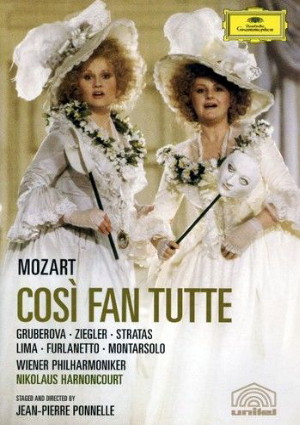 |
2 DVD
- 0440 073 4237 4 - (c) 2006
|
|
Wolfgang Amadeus
Mozart (1756-1791)
|
|
|
|
|
|
| Così fan tutte, ossia La
scuola degli amanti, KV 588 |
|
|
| Dramma giocoso in due atti -
Libretto: Lorenzo da Ponte |
|
|
|
|
|
| - Ouvertura |
4' 18" |
|
- Atto Primo
|
86'
41" |
|
|
|
|
- Atto Secondo
|
84' 30"
|
|
|
|
|
| BONUS
"Jean-Pierre Ponelle rehearses Così fan tutte" |
34'
19" |
|
|
|
|
Edita Gruberova,
Fiordiligi, Dama
Ferrarese sorella di Dorabella
|
Jean-Pierre
Ponnelle, staged, directed by
|
|
| Delores Ziegler,
Dorabella, Dama Ferrarese sorella
di Fiordiligi |
Cerratelli
(Firenze), costume realization |
|
| Ferruccio
Furlanetto, Guglielmo, amante
delle sorelle |
Helmut
Ehringer, lighting |
|
Luis Lima, Ferrando, amante
delle sorelle
|
Wolfgang
Treu, director of photography |
|
| Teresa Stratas,
Despina,
cameriera |
|
|
| Paolo Montarsolo,
Don Alfonso,
vecchio Filosofo |
|
|
|
|
| Continuo: John
Fisher, Harpsichord /
Luciano Pezzani, Violoncello |
|
| Konzertvereinigung
Wiener Staatsopernchor /
Helmuth Froschauer, Chorus
Master |
|
| WIENER
PHILHARMONIKER |
|
|
|
| Nikolaus
Harnoncourt, Conductor |
|
|
Luogo e data
di registrazione
|
- Film: Bavaria Studios,
Munich (Germania) - 1-15 giugno 1988
- Sound: Studio Rosenhügel, Vienna
(Austria) - 25 febbraio / 12 marzo 1988 |
|
Registrazione
live / studio
|
| studio |
Producer / Engineer
|
| Roland Hott / Helmut A. Mühle
|
Edizione DVD
|
| Deutsche Grammophon - 0440 073
4237 4 - (2 dvd) - 90' 59" + 84' 33" +
Bonus 34' 19" - (p) 1994/2006 (c) 2006 -
Unitel (c) 1988 - (IT) GB-DE-FR-SP-CH |
|
|
A Game of Love
and Change
|
Written in only a few
weeks in the autumn of 1789 in
response to a commission from Emperor
Joseph II of Austria, Mozart's
exquisite comedy about the fidelity of
women was felt by many of the
composers contemporaries to be
offensive and frivolous, a critique
levelled above all at Lorenzo da
Ponte's libretto. And yet the plot of
Così fan tutte ossia La scuola
degli amanti (All Women Do the
Same, orThe School for Lovers) was
based on familiar models, occurring
not only in plays by Goldoni and
Marivaux but also in two of Molière's
comedies, L'Ecole des femmes
and L'Ecole des maris, the
very titles of which recall the
subtitle of Mozarts opera. Prompted by
a wager, tvvo couples learn how easily
they can be seduced as the result of a
controlled experiment that allows them
to swap partners, releasing them from
obligations of a private and social
nature. To that extent, the playful dramma
giocoso that is Così fan
tutte may be seen to contain the
same sort of Enlightenment ideas as
those found in Le nozze di Figaro
(1786) and Don Giovanni
(1787), the two earlier kindred
collaborations of Mozart and Da Ponte.
But whereas arias and ensembles still
maintain a precarious balance in Le
nozze di Figaro and Don
Giovanni it is ensembles that
predominate in Mozart's final opera
buffa, which received its first
performance in Vienna on 26 January
1790: twelve arias - including some of
the most beautiful that Mozart ever
wrote - are more than counterbalanced
by no fewer than eighteen ensembles.
Starting in 1955, Jean-Pierre Ponnelle
had already staged Così fan tutte
all over the world when he discovered
the potential of film as an operatic
medium. Film, he felt, was better
suited to the work, offering, as it
did, "a greater range of possibilities
than the stage". The present film was
made in Munich in 1988 and represents
a summation of Ponnelle's longstanding
engagement with Così fan tutte.
For the French director and designer,
this is a work of the "greatest
artificiality" and, as such, he chose
to stage it in the clearly stylized
setting of a coastal Palladian villa.
Dorabella and Fiordiligi are
indistinguishable from one another,
reflecting a symmetrical principle in
Ponnelle's direction that was worked
out to the very last detail and that
sought to visualize the strict
mirror-like structure of the opera's
two acts on a dramaturgical and
musical plane.
The wonderfully smooth and carefully
planned camera-work seems at odds with
the emotional confusion of the
characters, notably in the terzettino
"Soave sia il vento", during which we
see not the singers but the gently
moving surface of an artificial sea.
But Ponnelle regarded the camera as an
"additional means for the score to
express itself", one which, like the
music, allows us to experience for
ourselves the erotic tension between
the lovers in their reversed roles. In
his allocation of particular vocal
types to individual singers, Mozart
leaves us in no doubt that it is only
in their reconfigured relationships
that the lovers achieve a state of
musical harmony. On this point
Ponnelle follows Mozart's lead with a
particularly daring idea: here
Dorabella abandons herself not to some
masked admirer but to Guglielmo, whom
she recognizes as her
"brother-in-law", with evident
consequences for the second-act
finale, where reality and play-acting
are inseparably entvvined.
West German Radio had planned to
record all Ponnelle's productions of
Mozart's operas, but Così fan
tutte was the last opera film on
which he worked: he died on 11 August
1988 at the age of fifty-six, shortly
after completing the present film, his
fourth Mozart opera after Le nozze
di Figaro, Mitridate and
La clemenza di Tito.
Klaus Oehl
(Translation:
Stewart
Spencer)
|
|
Nikolaus
Harnoncourt (1929-2016)
|

|

|
|